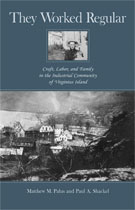They Worked Regular
Craft, Labor, and Family in the Industrial Community of Virginius Island

- Author(s): Palus, Matthew M., and Paul A. Shackel
- Series:
- Imprint: Univ Tennessee Press
- Publication Date: 2006-01-30
- Status: Active
- Available in Hardcover - Cloth: Price $35.00 | Buy Now
Virginius Island is a landscape of ruins, a shadow of its former industrial might. Today, the island consists of approximately twelve acres and numerous remains of industries and domestic structures maintained by Harpers Ferry National Historical Park for the purpose of interpreting industry. Archaeological investigations over the past several decades have focused on recovering remnants of its industry, while recent work has also examined the lives of the workers and their families. The history of this West Virginia island is linked closely with the nineteenth-century developments that occurred at Harpers Ferry and the rest of the industrializing Mid-Atlantic region.
This book addresses the memory of the small island’s industrial community, showing the relationship between changes in industrial management techniques and the changes experienced in daily life by workers and their community between 1800 and 1930. During this time, the island was populated by craftsmen, laborers, mechanics, capitalists and their employees, and numerous families. Factories and mills harnessed waterpower to produce goods. By the late nineteenth century, industrial management techniques had shifted from strong paternalistic controls to absentee forms of ownership, and the island was home to a single, economically homogenous class. Manufacturing was replaced by extractive industries.
The authors examine the local and national significance of historical trends toward industrialization at Virginius Island by combining perspectives from archaeology, oral history, the theory of collective memory and identity, and the contemporary uses of heritage. This analysis offers readers an understanding of the cultural process of industrialization.
They Worked Regular will appeal to readers interested in the history of Virginius Island and Harpers Ferry, archaeology, heritage studies, industrialization, and cultural resource management.
